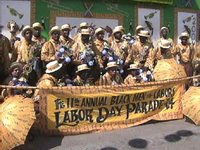Friday, September 29, 2006
Thursday, September 28, 2006
Yes, There Is an Election Saturday
 Thursday evening, WWNO featured the first of two interviews with Jim Brandt of the Public Affairs Research Council of Louisiana about the 13 amendments on the slate Saturday. Schroeder has written about the piss-poor job local radio generally does in serving the community and I won't disagree with him. Thursday before the election is kind of late to start talking.
Thursday evening, WWNO featured the first of two interviews with Jim Brandt of the Public Affairs Research Council of Louisiana about the 13 amendments on the slate Saturday. Schroeder has written about the piss-poor job local radio generally does in serving the community and I won't disagree with him. Thursday before the election is kind of late to start talking.Thursday, Brandt discussed Amendments 1-3; Friday, he'll cover Amendments 4-13 in the same amount of time. The PDF of the PAR report explains each amendment without making recommendations. With a limited time in the booth and a lot of fucked-out legislative "language" to read (it makes sense but I'm an English teacher and a writer and a word freak), you just can't make a decent decision at the moment. (Not that you ever can.) Low turnout, low interest/apathy, lack of apparent choices...we have half the population and all the same problems.
Brandt made the point that with voter turnout expected to be around 15%, it will only take a little over 7% of voters to change the state constitution. Start trembling now.
Related Links:
Ahem, Elections This Weekend
Recommendations for September 30th 2006 Ballot has recommendations from the Bureau of Governmental Research, Gambit Weekly, the Louisiana Weekly, the Louisiana Federation of Teachers, the Dead Pelican, and the Greater Baton Rouge Business Report.
Sunday, September 24, 2006
Friday, September 22, 2006
If You Fire Them, They Won't Come

Thursday, September 21, 2006
Mini-Lesson: Style
The placement of "anymore" leads to ambiguity. Does it mean the weirdos don't fuck pumpkins now but did in the past (did they need the sex therapy then or now?) or does it mean that sex therapy is now also for people who do not fuck pumpkins (sounds misguidedly exhibitionistic anyway).
Revison: Sex therapy is no longer just for weirdos who fuck pumpkins.
And that way you get to end with the "clever" fuck-pumpkins image.
Monday, September 18, 2006
Survivors Village: Nine Myths and Realities about Public Housing in NO
1) “The storm did irreparable damage to public housing projects like St. Bernard. For this reason they should be demolished.”

Some public housing apartments were damaged by Katrina, but most were not. The developments HUD wants to demolish remain fit for human habitation. Dr. Marty Rowland, a civil engineer who conducted an informal survey of the units in several developments including St. Bernard, has assessed that the vast majority of units are habitable with rewiring and restoration of utilities. Second and third floor units were hardly damaged at all. Reopening the units would allow residents to return and begin the work of cleaning up.
2) “Those [public housing projects] were horrible places to live in before hurricane Katrina. We should all be glad they’re gone.”
Life for public housing residents in New Orleans may not have been ideal before hurricane Katrina, but this is no reason to demolish their homes. Destroying public housing and
displacing residents will only make their lives more difficult. It will uproot communities, separate families, increase homelessness, and raise unemployment as displaced residents find themselves forced into unfamiliar and hostile surroundings.
Our first step in addressing the problems that public housing residents face should not be to
destroy their homes. Reductions in the total number of affordable housing units is exactly the
opposite of what New Orleans needs right now as more than 200,000 citizens remain displaced.
3) “The projects were breeding grounds for poverty, crime, drug abuse.”
Public housing does not create poverty, crime, drug abuse, or any of the other problems affecting residents and their surrounding communities. These problems are much more complex and widespread. The vast majority of public housing residents are law-abiding productive citizens, no different than in other communities. Reducing public housing subsidies, demolishing units, and forcing out residents is simply another example of the overall problem -- we are taking too much from the working poor who live there and not giving anything back. Public housing does not breed social ills; they are symptoms of racism and poverty.
4) “Public housing and low-income housing in general were always intended as a crutch, a temporary place for people to live while they get back on their feet, find a job, and a permanent home.”
Public housing was created so that families and persons who cannot afford market rate housing can have a roof over their heads. The US Department of Housing and Urban Development imposes no time limits on the duration of a family or individual’s stay in publicly assisted housing (and never has). Public housing was never intended as “temporary assistance.” In fact, projects like St. Bernard and Iberville were built because the country recognized that people working entry-level jobs didn't earn enough to support a family. Living in these projects carried no stigma.
By the 1960s public housing was increasingly designed to serve the needs of those 8.2 million
families living below the poverty line in the United States. In New Orleans before hurricane
Katrina, there were at least 26,000 poor families and almost 30,000 individuals who were eligible for publicly assisted housing.
Another way of estimating the city’s need for better low-income public housing assistance is by
gauging the affordability of housing in New Orleans. Before Katrina 36% of families in New
Orleans spent more than 35% of their income on housing. According to HUD, for housing to be deemed affordable a family should have to “pay no more than 30 percent of its annual income on housing.” Since Katrina, the cost of housing has drastically risen, further increasing the percentage of income that families spend on housing. Clearly there is an enormous need for public housing in New Orleans to support those who cannot afford the privilege of living in Uptown, the Marigny, or out in Jefferson. We should not expect time limits to public housing. It is unrealistic and cruel.
5) “High density and concentrated poverty is the problem. If we just reduce the number of units by redeveloping them, spreading them out, and building ‘mixed income’ or ‘mixed use’ buildings we can revitalize these communities.”

This statement illustrates what social scientists call a “spatial fetish.” A spatial fetish is a theory or belief that claims poverty, crime, delinquency, or other social ills are caused by poor urban planning, residential density and crowding, or general urban environment. It is a fetish because it draws attention away from the real causes of poverty. It is appealing because it proposes simple solutions that involve mostly the redevelopment of urban space without the need to address issues of racism or social justice.
Social scientists have not demonstrated a causal link between concentrated poverty and increased social problems within specific neighborhoods. There is a correlation, but simply erasing pockets of concentrated poverty by demolishing and redeveloping them does nothing to solve the problem. It does however cause mass displacement of public housing residents in the meantime.
6) “Poor people will have more opportunities to better themselves when they are integrated in mixed income communities.”
This is wishful thinking at best. Many displaced residents experience no positive change in their life chances after their former homes are demolished and redeveloped along these lines. Indeed, because redevelopment takes years and 80-90 percent of residents are not allowed to return, many find themselves further dislocated and entrenched in poverty.
The real problems are poverty and racism. Mixed income communities cannot be created by
decree. They can only be created once society is more equitable and people have more control
over their lives. If we are serious about creating mixed-income communities we will develop
affordable and public housing in affluent communities and provide more support and services to poorer areas rather than forcing out residents and redeveloping their homes in the name of some elusive goal.
7) “Public housing and low-income housing programs are government handouts (entitlements) that should be ended. It just perpetuates the cycle of poverty, hopelessness, and irresponsibility amongst the poor.”
Public housing programs are ‘government handouts,’ but so are the enormous middle and upperclass housing subsidies that dwarf HUD’s programs targeting assistance to the poor and working class. In 2006 the federal government will funnel $136 billion in guaranteed loan commitments to middle and upper-class homebuyers. Compare this to only $6 billion that will [be] spent on housing for the elderly, housing for the disabled, AND public housing combined. ...
8) “Residents don’t want to come home. They’ll be happier and better off with the opportunity that hurricane Katrina has provided.”
It’s probably true that some residents are choosing not to return to their previous homes. However, published US guidelines guarantee the right of return for internally displaced people, and many thousands do want to return to their homes in New Orleans. Instead of assuming what residents want, HANO, prospective developers, and civic groups should do everything they can to reach out to public housing residents and listen to their concerns and desires.
9) “HUD has already decided to demolish St. Bernard, C.J. Peete, B.W. Cooper, and the Lafitte projects to build better ‘mixed-income’ communities in their place. People should move on.”
While HUD’s proposal is unfortunate, it is by no means the final word. Residents are returning
and want their homes back. We should support them in their right to return regardless of what
HUD has said it intends to do. HUD’s plan for these four developments is virtually the same
blueprint it used in the failed River Garden experiment that has not provided adequate housing for former St. Thomas residents. This is a national trend that is pushing tens of thousands of poor citizens out of their homes and demolishing their communities. So called “mixed-income” communities are always built on demolished low-income communities. They typically result in far fewer affordable housing units for those who used to live there and marked increases of homeless families.
Notes removed from original.
Friday, September 15, 2006
The Perpetually Prodigal Daughter
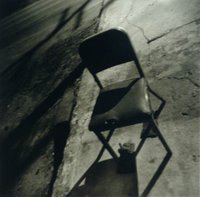 I've left and returned to NO a few times. I left for college, came back for a while, left to work (not enough, not well, not lucratively or in any truly beneficial way), came back, left again for school, stayed away a while and came back with husband and daughter in tow, a husband who had fallen in love with the city through Jazz Fest and brass bands. I saw the city again showing him and could finally sort the shit from the sweet. And we never thought we'd leave. It wasn't an option in any way. We'd moved for good.
I've left and returned to NO a few times. I left for college, came back for a while, left to work (not enough, not well, not lucratively or in any truly beneficial way), came back, left again for school, stayed away a while and came back with husband and daughter in tow, a husband who had fallen in love with the city through Jazz Fest and brass bands. I saw the city again showing him and could finally sort the shit from the sweet. And we never thought we'd leave. It wasn't an option in any way. We'd moved for good.Until 2006.
It wasn't just Katrina. It wasn't just the shredding of universities, a shredding Mister escaped and I got caught in, then taped back together to put in more hard time. It wasn't just the state of the city post-Katrina. It was abject fear. Fear my job would disappear or, worse, cause more confusion and damage by not disappearing. And the despair. There is nothing like watching someone suffer. It scrapes the insides raw. Watching, listening to, feeling hundreds of thousands of people suffer made me ready to run again. And fury. The despair fuels (at least some of) my anger. There's still a precocious child in me screeching that shit has got to be fair.
What's stopping me is that every time I left, NO didn’t leave me. I celebrated Mardi Gras, made beignets, made coffee and chicory that stained cups and spoons, kept Tabasco in the house at all times, cooked red beans and rice (often on Mondays), and always thought of myself as a visitor where I was, not settled, ever, just passing through, sometimes for years. I spent 10 years away and moved every 2 years. There was no home outside of NO.
I wasn’t born here but I am a NO girl. Crape myrtle trees on Broad St., shopping at the Gentilly shopping center and Schweggman's and Canal Villere; going to Jackson Square on weekends to hear my grandfather's brass band, and others, play; wandering Jazz Fest talking to European tourists, playing with whomever I found and being fed from the coolers of people who anywhere else at any other time would be strangers. My grandfather taught me to stomp doubloons and beads, too, fingers and all, and if someone else stomped on the beads and wouldn’t let go, he taught me to bend down and break the beads. We shopped at Goudchaux's and Maison Blanche and Holmes on Canal St. I went to Catholic schools then a magnet school and rode the streetcar and discovered Uptown. I lived near the fairgrounds, in New Orleans East, in Gentilly and knew Algiers and Central City through my grandfather and the other old men he'd sit with. I recall buildings, corners, now-abandoned stores but no street names. It's not about knowledge of geography or friends or family ties but something visceral. I feel this place and only this place.
Wednesday, September 13, 2006
One Year and 15 Days Later
District B Neighborhood Meeting Impression #1: Nagin has charm and Shrub's penchant for acting down-home (though Nagin is infinitely better at it) and he can make you think in person that he means well but I have no more faith or trust in him than I did when he first ran for mayor. His religious adherence to a "market-based approach to recovery" for the city is not only bullshit but dangerous for NO, its recovery and the chocolate of the city he claims to want to keep from melting away. (I'm sure Rob Couhig and Virginia Boulet can help him with that.) The "market-based approach" has brought us inflated contracts, a utility about to squeeze us dry, blighted housing standing for years (because of the sanctity of private property) while the brick buildings of public housing are demonized, and wages and prices and rents rising and falling independently of each other based on greed and "market-based" opportunity and belief in the amorality and fuck-the-future-ness of The Market. Not all things should be run for profit. Not all things have, or should have, a dollar value purely for sale or purchase. The Market does not have to see or manage anything like race, pollution, crumbling public schools, rape, and exploitation. Exploitation is good if it leads to profit, bad only if it doesn't pay. Who cares where the single mothers who do (or did) much of the invisible work in this town end up, as long as those condos keep going up? (I'm still trying to figure out who the fuck is buying all those $200-400K condos.) A "market-based approach" is also a cop-out. Bad results? It's just The Market. Astronomical rents? It's just The Market. Once "supply" gets closer to "demand," prices will go down. (One of Nagin's aides said that--if you were there and remember which one, please remind me.) Why? Because of the purity and inherent wisdom of The Market. Trash not picked up even though you pay for twice weekly pickup with recycling service? It's just The Market and The Market will correct itself as and when it sees fit. The Market is self-controlled, oblivious and indifferent, chaotic, independent, all-knowing, needy and thin-skinned, jealous, correct even when it is wrong, harmless even as it kills, its strength based on the vapor of blind belief. Sounds like a monotheistic god. Nagin's "market-based approach" means he can sit back and be in charge without being responsible/accountable.
 I was disappointed by Stacy Head. The impression I got from her two outbursts (the first about getting citizens together to haunt Judge Elloie's courtroom to object, somehow, to his bonds and rulings; the second at a club owner who said the council had imposed a curfew on clubs that was hurting his business--her response was that, like her 4-year-old, he had to follow the rules) is that she has a negatively strident, screeching tendency that appeals to the kind of "neighborhood activists" who want to string up skateboarders and burn crackheads alive in the street. I thought she'd bring rationality to the table. I'm not making final judgment and will wait and see. But usually my first impressions bear out.
I was disappointed by Stacy Head. The impression I got from her two outbursts (the first about getting citizens together to haunt Judge Elloie's courtroom to object, somehow, to his bonds and rulings; the second at a club owner who said the council had imposed a curfew on clubs that was hurting his business--her response was that, like her 4-year-old, he had to follow the rules) is that she has a negatively strident, screeching tendency that appeals to the kind of "neighborhood activists" who want to string up skateboarders and burn crackheads alive in the street. I thought she'd bring rationality to the table. I'm not making final judgment and will wait and see. But usually my first impressions bear out.If my relationship with NO were a marriage, I'd be ashamed, as a feminist, thinker and general human, of my behavior--hysterical ranting, bitterly cold shoulders, venomous criticism, desperate-yet-regular wild fucking, despair, bemused tolerance, tenderness I feel is mostly one-sided, constant triple-guessing whether to stay or leave yet again or whether I should've come back the last time even though I knew, and everyone told me I knew, better. I would advise myself To Finally Leave. Even though I want to, I can't.
Monday, September 11, 2006
One House at a Time
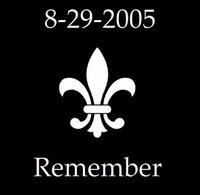 This time, it's Morwen Madrigal, our dear Gentilly Girl, who needs help clearing/gutting her house. If you can help, there's a wiki page set up to volunteer for dates, bring equipment or donate cash to the cause. If you can help, please do. Morwen is not just a Gentilly girl but a New Orleans girl through and through. And she can rant like I don't know what!
This time, it's Morwen Madrigal, our dear Gentilly Girl, who needs help clearing/gutting her house. If you can help, there's a wiki page set up to volunteer for dates, bring equipment or donate cash to the cause. If you can help, please do. Morwen is not just a Gentilly girl but a New Orleans girl through and through. And she can rant like I don't know what!
Friday, September 08, 2006
"Snakes Very Very Vicious, Fuck You, No!"
Morwen Madrigal has had it with Nagin and she's getting the recall paperwork Monday. (See her open letter to His Alleged Honor here. She rants good like a New Orleanian should.) It is a long shot and numerically seems damn near impossible (see Ashley Morris' RECALL post and the comments) but the symbolic value and catharsis of it are worth it.
I'd like to ask C. Ray what he's done for black New Orleans other than being black. If you want to ask him something, come one, come all to the District B Community Meeting tomorrrow.
Need reasons to want to recall him? Read this and this and this and this and this. I'll get some more links together very soon. Trust G Bitch on that one.
Thursday, September 07, 2006
District B Face-to-Face with Nagin
Nagin's first District B Community Meeting
Allie Mae Williams Auditorium
2020 Jackson Avenue
New Orleans
Be there! Tell the man what you think!
Wednesday, September 06, 2006
Faster, Food! Kill! Kill!: 4
 I was hoping for more heart-deteriorating food. Though this could qualify if I knew what it was made of....
I was hoping for more heart-deteriorating food. Though this could qualify if I knew what it was made of....Without the danger element, it's rather boring but I figured there should be closure.
A Lack of Charity
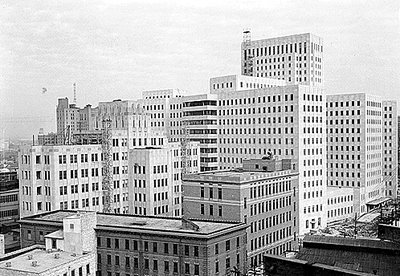
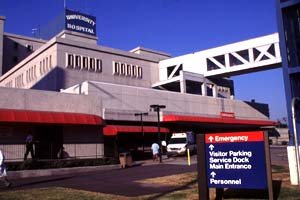
My mother worked at Charity, and later University Hospital, at least half of my life. When she and her colleagues were finally evacuated, the last hospital to be cleared after Katrina and the levee breach flooding, the last hospital to get not only its patients out but its staff, the doors of Charity, for the first time since the building opened, were locked. Nurses cried. Charity had never been closed before. It served the working poor and indigent and homeless, police officers with gunshot wounds (like many city hospitals with Level 1 trauma centers, some folks called the place the Knife and Gun Club), car crash surviviors, young mothers in labor, patients from Louisiana and Mississippi and Central America. And now it is partly housed in an emptied department store. Like I tell everyone I know, don't get shot.
The Times-Picayune did a lovely series on Memorial Hospital's post-storm tribulations (and the doctor and nurses accused of murder, charges many are still baffled by) but has said little about Charity and University hospitals. Both hospitals were closed and thousands of people, including the first responders who spent 5 days in the lowest pit of hell, many who were black and had college degrees and years of experience, many who lived in Gentilly and New Orleans East and Broadmoor, were fired or demoted. In my mother's case, she was offered a job a grade lower than her last job in a central LA town already overrun with evacuees with no open apartments or motel rooms; that was her only choice. She was lucky--she was eligible for retirement and took it. Other nurses she worked with, nurses in their late 40s, 50s, even early 60s, found themselves with no job and when they applied to the few hospitals in the NO metro area still up and running, their experience in case management, clinic management, what-have-you was ignored and they were put "on the floor," working wards for the first time in 15-25 years. Sounds easy but it's more like marching in a brass band at age 65 after 20 years away--you are physically older and a bit slower though you are wiser and more experienced and an excellent resource. It's also a huge pay cut. And demotion, like going from distinguished professor to non-tenured instructor. Some have been called back and placed underneath people with less education, less experience or no experieince in that section at all. And though I despise all conspiracy theories and the impressions they give and the facts and truth they distort and obscure, I have heard from several of them that the people called back first and promoted without the requisite education or experience have mostly been white. Sigh.
What did those in Charity go through? September 1, Day 3, director of trauma surgery at Charity, Dr, Norman McSwain (who also runs the medical tents at Jazz Fest pretty much every year) told USA Today
Dr. McSwain's statement "broke" the heart of Mike Leavitt, secretary of HHS because"Somebody needs to come in a hurry," .... "By 'in a hurry,' I don't mean tomorrow or the next day. They need to get here tonight.
"By tomorrow, we'll have dead patients simply because they were not evacuated."
Dr. McSwain pleaded for help, using the MSM because he felt no one else was listening:
"There are tens of thousands of people doing their best to get there in a hurry."
“We have been trying to call the mayor’s office, we have been trying to call the governor’s office ... we have tried to use any inside pressure we can. We are turning to you. Please help us"
When I heard that, panic set in. I feared my 63-year-old not-in-the-best-of-health mother might not make it out of Charity alive. It was a rational fear at that time. Other folks weren't making it out of the city alive.
Inside Charity, it was humid and hot, stinking with urine since there was no plumbing (multiple survivors talk of using buckets, garbage pails and bags for toilets), and food would start to run out soon. My mother says they were all trained for a 3-day stay, that by day 3, replacements would come in to relieve them. No one came.
Day 4, my mother called us a couple of times from an office phone that was still working. Her cell phone didn't work at all and mine only received calls but she had my brother-in-law's phone number. She wouldn't talk about specifics, except the few nurses who "cracked," as she put it, and were brought up to the psychiatric ward, but did say they were all told to be ready to evacuate at any time. In hindsight, I think it was to keep them all from losing hope. She had no news. We told her about the flooding, about the other hospitals being evacuated, about the slow response, about the Superdome and Convention Center.
Day 5, my mother called at least 5 times, sounding brighter because it looked like they were finally getting out. After being knocked down a pitch-dark stairway and breaking her glasses, tripping and falling, slipping off the lifeboat that floated them out and a few bewildering hours as she was told different places she might be bused or flown to, she got to Houston. It was Day 5 when they started taking out the rest of the patients, when the staff got out, when the doors were locked and folks cried.
Patients finally rescued from Charity Hostpital:
...18-wheel trucks rolled in front of the hospital to remove the final patients and personnel late Friday. [my emphasis]The trucks went to New Orleans' international airport or to the state capital of Baton Rouge.
The facility -- the largest public hospital in the city and a comprehensive trauma center -- was accommodating scores of patients Friday before it was emptied.
The move came two days after the same kind of evacuation at nearby Tulane Medical Center. [again my emphasis]
I have not talked to my mother in depth about it. When she and her friends get together or see each other in the mall or talk on the phone, they often "debrief," as she says. She is not ready to work in another hospital again. And might not be for some time. I wish someone cared about Charity's story.
Other eyewitness accounts:
- Doctor Endured Worst of Charity--Dr. Michael Garbee's experiences
- Hospital's Will to Survive Grew with Floodwaters
- HURRICANE HEROES: Hospital worker gave patients what she had
- Unexpected Necessities — Inside Charity Hospital by Ruth Berggren, M.D.

pic from Gun Shot Wounds by John Fox
Tuesday, September 05, 2006
Links & Such
I have finished Disaster: Hurricane Katrina and the Failure of Homeland Security and seen a little over half of When the Levees Broke (I had to stop at the montage of waterlogged dead bodies). I will finish it this week or weekend; so far, I am impressed with what for Spike Lee is restraint.
Dambala has a link to a petition to recall Mayor Nagin. As much as I am into that, I wonder how it gibes with this post from Ashley Morris about the near impossibility of recalling a NO mayor. It's worth a try.
Dambala's "Ain't That America" is brilliant. Read it NOW.
In general, go read Schroeder. He's been hitting it hard and admirably for quite some time--"Are NOPD Commanders Talking to Homicide Detectives?" "The Revolution Will Not Be Televised," "Eddie Jordan is a Big Cry Baby!" and especially "New Orleans, 1 A. K."
Saturday, September 02, 2006
More Faster, Food! Kill! Kill!

But the worst, the one I voted for, the Deep Fried Mac-'n-Cheese on a stick, doesn't go over well. There is a mysterious fish smell to it. Double eww.





